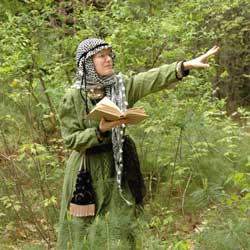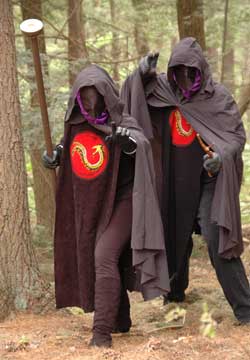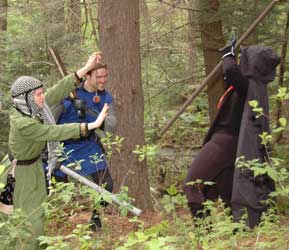Rules of Magic

The Magic System
The basics of the magic system are:
- You mark off the spell points you are using to power the spell.
- You open your spell book to the correct page.
- You blow a whistle if you're casting a Combat spell.
- You read the spell incantation from your spell book.
- You end with the word "Initium!"
Using Spell Points
Mages, clerics, and mystics (but not those with Innate Power) have a number of spell points based on their level of the Magic skill. These spell points are spent by casting spells.
Before you can begin a spell, you must mark off the spell points that the spell will use up. There are two ways to do this:
Standard Method
Check off the spell points that the spell uses up (equal to the level of the spell) on the tally sheet in your spell book.
Pre-Casting
For convenience and/or speed during rapid combat, a spell may be "pre-cast." Pre-casting means that the you need not take the precious seconds during combat to check off the spell points on your tally sheet.
To pre-cast a spell, first check off the number of spell points equal to the level of the spell, (as if it were actually being cast). Then, place a marker (such as a Post-it note) on the spell page. When the spell is cast, remove the marker rather than mark off points on the spell tally.
Once a spell is pre-cast, its spell points may be reclaimed and the points may be moved to pre-cast a different spell. Any number of spells may be pre-cast (provided you have enough spell points), and a spell may be pre-cast more than once.
Spell points used in pre-casting a spell are considered unspent until the spell is cast—pre-casting is merely a notational convenience.
Finding the Spell
Once the spell points have been marked off, you must open your spell book to the page with the desired spell. The spell book must be in hand. At that point, the spell may begin.
Beginning the Spell
Noncombat spells are cast in real time and do not interrupt action. The caster begins the spell by touching the target(s) (if the spell is touch range) and beginning to read the spell.
Combat spells, by contrast, stop activity, because they are instantaneous. When the caster blows their whistle, all activity ceases.
If not everyone needs to know about a Combat spell, then you don't have to blow your whistle full-blast. For example, in a mass-combat scenario, if you're casting Shatter Limb at an opponent right in front of you, you can blow the whistle lightly (or simply say "Tweet!") and then conduct a "local spell freeze." This way, all the other players aren't stopped in mid-action by your spell freeze.
Reading the Spell
For Noncombat spells, the caster simply reads the spell aloud. If the spell is being cast on someone other than the caster, the caster must be close enough to continuously touch the target during casting (although usually casters only need to touch the target once to prove this). If the casting is interrupted, then the spell fumbles.
For Combat spells, the caster reads the spell during the spell freeze, also throwing a missile component or touching the target if necessary, making sure to return to their original position afterwards.
Casters need not follow the incantation in the spell book word-for-word. They may add personal color to the description, as long as the spell's effects are still clear.

Ending the Spell
Noncombat spells take effect when the caster begins to say "initium." If the spell has not been interrupted by that point, then it is successful.
Combat spells conclude, their effects occur, and action resumes when the caster says "initium."
Appropriate Combat Spells
Spell casters should choose their Combat spells and their time to cast them carefully. Try to avoid turning a battle into a game of "red light, green light" if you can. Remember, spell freezes often help an enemy by giving them time to think! Instead of throwing a whole lot of nuisance spells, throw a few spells timed for maximum effect, and when you do cast a spell, cast it quickly and efficiently so that the battle can continue.
Also, remember that if not everyone needs to know about the spell, you don't have to blow your whistle full-blast.
Casters may leaf through their spell books, mark off points, etc., during spell freezes. Doing so can cut down on wasted time and make casting faster.
Spell Effects
Fighters should become familiar with the effects of most mage and cleric spells so that mid-battle explanations are unnecessary. Most spell phrasings describe the effects well enough, but if there is any doubt, a full and straightforward description can be found in the spell glossary.
Lasting effects from multiple castings of spells with the same effect are not cumulative. For example, if you are shrunk and another Shrink spell is cast on you, then you do not become any smaller and the first spell does not continue to have a discernable effect. You merely become unshrunk once the second spell wears off. Spells with variable effects, such as Emotion, can be cumulative (i.e., more than one can affect a single target), as long as the effects differ. Spells with functionally identical effects (Barkskin and Stoneskin) are noncumulative with themselves or each other. Targeting the same person more than once with a "Mass" spell will not produce any additional effects.
Any exceptions to these rules will be explained in the spell descriptions.
Magic Resistance
Certain large or powerful beings can resist the effects of some magic spells. Generally speaking, higher-level spells are more likely to work than lower-level spells, and spells that remove hits of protection are more likely to work than spells that don't.
Special Spell Types
Missile Spells
Missile-range spells (such as Stun Bolt or Lightning Bolt) have an additional procedure. During the spell freeze, after reading the incantation, the caster tosses a thrown component (e.g., a small Koosh ball or lightweight cloth ball) underhand at the intended target. (Overhand tosses are considered a spell fumble.)
If the component hits a hand or foot, it counts as a hit on the relevant limb. If it hits the head, it counts as a torso hit. (However, do not aim for the head.) If it hits an item held in a hand (i.e., shield, weapon, etc.) it affects the relevant arm. If it hits someone besides the intended target, then that person becomes the target of the spell. If it misses completely, then the spell fails and the spell points are wasted.
After tossing the component, the caster should retrieve it before action resumes.
Touch Spells
Some Combat spells are touch range (e.g., Wounding Grasp). These are cast as follows:
During the spell freeze, after reading the incantation, the caster must touch the target. The caster must keep one foot rooted to the casting location while attempting to touch the target. If the caster cannot reach a target without moving both feet, then the spell fails and the spell points are wasted. As with missile spells, touching an item held in a hand affects that arm. Do not touch the target in an inappropriate area, including the head, neck, armpit or groin.
After touching the target, the caster should return to the original position before action resumes.

Test of Will Spells
Some spells are designated "Test of Will" (or TOW) spells. These are not always successful, even if cast correctly.
When a caster performs a TOW spell, they must state their level of Will (as defined by the Will skill) during the casting. If this level of Will is higher than the target's Will, then the spell succeeds. But if the caster's level of Will is equal to or less than the target's Will, then the spell fails. The target may ignore the spell completely, or announce that the spell has failed. The target cannot choose to allow the spell to work (and therefore cannot be forced to allow it to work).
If a caster fails to state their Will during the casting of a TOW spell, the spell fumbles.
Safe Spells
Safety is an aura of magical protection granted to clerics. For as long as characters are under the protection of a Safe spell, they are impervious to harm by any magical or physical means. They may talk and move around during the spell, but may not attack or cast spells on targets outside the spell's protection.
Safe spells protect the caster and one or more other people. Those targets must be touching the caster-or, in the case of a Safe Circle, inside the circle-at the time of casting. A target who leaves the safety (that is, stops touching the caster or leaves the circle) may not return. If the caster leaves the safety (for example, to attack or cast spells on targets outside the protection), the spell ends.
To represent the aura of safety, the caster should wave a piece of gold or yellow cloth or rope overhead, wear the cloth or rope on the head, or, if in a Safe Circle spell, stand inside a circle of yellow rope placed on the ground. The player must say "safe" whenever near combat so that everyone is alerted to the magical aura (and does not believe that the safe character is just ignoring spells and attacks). When in the middle of combat, a player should repeat "safe" frequently (sometimes constantly).
A Safe spell grants its aura of safety from the moment casting begins. A caster may begin a new Safe spell while one is currently running and, through multiple castings, may maintain a continuous aura of safety.
Curse Spells
"Curse" spells are cast in a special method. The spell page for Curse spells will list a number of afflictions. During the spell freeze, the caster chooses the desired affliction, and reads it to the target.
Each Curse spell will have one or two standard afflictions. If casters wish to personalize their characters, they may replace the spell's standard afflictions with up to three afflictions per curse spell which may be chosen from a list of afflictions pre-approved by the Rules Committee (the Curse List). Each affliction found on the Curse List is available to all casters. The Game World Committee of the game world (or the GM of a one-shot game) may provide recommendations on how players may use the afflictions to better integrate their characters with the game world. Once chosen, each affliction should be attached to the spell page(s) in the character's spell book, providing up to three different choices of afflictions when casting a Curse spell. Casters may change their selection in between games, choosing new curse afflictions from the Curse List, as long as they do not exceed the maximum of three options per curse spell per game. The Rules Committee will handle proposals to add, subtract, or modify afflictions on the Curse List, which can be found on the Curse list.
For Continuing Games
Clerics of the gods in the CG pantheon will have a recommended set of afflictions, based on what god the cleric follows. These can be found on the CG Curses page.
Meta-Magic
Meta-magic is special Combat magic that affects normal Combat spells. There are two types: counterspells (Nullify, Reflect, and Redirect) and Fortify. Clerics and mystics may only use Nullify and Fortify; mages may use any meta-magic they wish. You must be able to cast a spell to be able to use meta-magic on it.
Counterspells stop or alter Combat spells. They are begun during the casting of the spell to be countered. For example: Alfred begins casting a Rootfoot spell. Beth wishes to counter the Rootfoot with a Nullify counterspell. Beth marks off her spell points, blows her whistle during Alfred's spell freeze, reads her counterspell, and thus Alfred's spell is nullified.
Fortify prevents any counterspells from being used on a Combat spell that you cast, but it fatigues the caster for five minutes (see the section on fatigue, p. 60), thus making them unable to stand, fight, walk unassisted, or cast spells for five minutes. Fortify is not cast separately, but is conjoined to the spell to be fortified. For example, one might say "I cast the fortified spell of Death. Let thee now be struck dead, and may this spell be immune to countermagic. Initium."
The cost of meta-magic depends upon the level of the spell to be affected. Nullify costs as many spell points as it would to cast the spell; Reflect costs the casting cost plus two; and Redirect costs the casting cost plus four. Casting a fortified spell costs twice as much as it would cost to cast the spell.
Restrictions on Casting
(the "Hands-Free" rule)
Combat spells (but not Noncombat spells) require the hands and arms to be free of weapons while casting. A spell caster may not cast a Combat spell while holding weapons or shields, cradling a weapon in the arms, or having a weapon on lanyard from the wrist, etc. The arms must be totally free when the whistle is blown (although weapons and shields may be sheathed or dropped before the whistle is blown). If a spell caster violates the "hands-free" rule, the spell automatically fumbles.
The exception to this rule is if the spell caster has the Battlecast skill. Spell casters with Battlecast can cast Combat spells while holding weapons and shields. (They must still use spell books.) Combat spells cast via Cleric Magic are also free of this restriction.
Arm wounds do not count as "restrictions" on that arm.
Spell Fumbles
A spell fumble only occurs when:
- One of the five steps is omitted (or)
- The steps are performed out of order (or)
- The spell was a Noncombat spell and was interrupted (or)
- You literally cannot understand what the spell was or who it was supposed to affect. If you can understand what the caster meant (not what they said, what they meant) then the spell succeeds.
The caster need not follow the exact wording of the spell (although it is recommended). As long as the meaning of the spell is clear, the caster may ad-lib or shorten the reading. Errors in dictation, pauses, or the occasional "um" or "ah" do not cause the spell to fail.
When a spell fumbles, the spell points are not used up.
Examples of Spell Fumbles
- (Mage blows whistle, then starts flipping through book to find spell.) The spell fumbles, because the spell was not ready.
- (Mage blows whistle, reads spell "I cast Charm upon thee, initium!") The spell fumbles because the spell is Test of Will and the caster's Will level was not stated.
- (Mage blows whistle, reads spell "I cast the spell of death, initium!") The spell fails because it is not targeted and it is impossible to tell who should take it.
- (Mage blows whistle, reads spell correctly, but is across the battlefield and thus too far away for the spell to be decently heard.) If the victim cannot hear the spell, or would have to yell "What?" in order to hear against whom the spell was targeted, etc., then the spell fumbles.
- (Mage blows whistle, crosses off spell points from tally, and then reads the spell correctly.) The spell fumbles because the mage must mark off the points before blowing the whistle.
Up-Casting
Spell casters may not cast a spell whose level is greater than their level of magic, with one special exception: up-casting spells. Once per day (recharging at sunrise), spell casters may cast (or fortify or counter) one spell that is one level higher than their present level. Casting this spell fatigues casters (see the section on fatigue, p. 60), making them unable to stand, fight, walk unassisted, or cast spells for five minutes.
If the spell's active effect is one that takes place after the word "initium" (such as Speak with Spirit, Safe Retreat, or Interrogate), then the fatigue occurs after the spell's real effect. For example, if you up-cast to Interrogate, then you would not weaken until after the questioning was done.
Recharging and Spell Renewal
All three Magic skills regain lost spell points at a certain time of the day, called "spell renewal." Spell renewal is a time (or times) when a GM will announce that all spell casters gain back a certain number of spell points per level. (Unless the GMs say otherwise, you may never have more spell points than you started the game with.)
Innate Powers, magic items, and the ability to up-cast a spell all recharge at sunrise.
